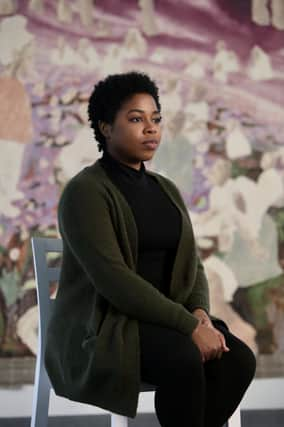Hastings offers first major UK show for Nigerian artist


It will explore her profound relationship with the natural world, says Liz Gilmore, director of Hastings Contemporary: “The Dance of People and the Natural World will not only introduce Omuku’s work to a wider UK audience, but also seeks to broaden the exposure and awareness of the vibrant contemporary Nigerian art scene. Displaying more than ten pieces, the show spans five of Hastings Contemporary’s eight galleries and includes works made between 2021 and 2023 that explore Omuku’s love of nature and the ways in which it provides her with a sense of safety and serenity. From 2021’s Lighthouse through to her latest, as yet to be titled work made this year (2023), the series focuses on a sense of re-immersion in nature.”
Nengi explains: “This comes from both a personal place, telling my story as a gardener and florist, as well as what I feel is a collective and re-communion with nature today.”
Advertisement
Hide AdAdvertisement
Hide AdBorn in Warri, Nigeria, Omuku spent several years in London, studying at the Slade School of Fine Art. She has subsequently developed a distinctive style which involves applying oil paint to gesso-prepared composite strips of the Nigerian fabric sanyan; a tightly-woven, hand-spun material that is an important aspect of Nigeria’s cultural history.
A further highlight of the exhibition at Hastings Contemporary will be the chance to see two new works made this year, along with her largest piece to date, Eden (2022). The display of this monumental painting (measuring 224 x 520cms) includes stools, scatter cushions and pot plants, echoing Nengi’s own studio set-up in Lagos. The ensemble invites visitors to pause and relax, enjoying a moment of quiet reflection and respite. In Eden, Omuku invokes a sense of the biblical paradise and a longing for a pre-fall state of tranquillity, alongside a sense of the solace to be found in nature. Eden also acts as conduit between the other works on display by further expressing the artist’s theme of the rest and sanctuary afforded by the natural world.
As Liz explains: “Eden represents an allegorical journey from darkness into light as the eye moves from left to right across the canvas, following the passage of figures as they traverse a utopian landscape composed in a vivid, Fauvist palette of complimentary colours.
“Welcome Home (2022) and Lighthouse (2021) both feature her signature spectral figures set in a dreamlike landscape. Still Life (2021) alludes to the time Omuku spent working as a florist and horticulturalist under her mother while the foregrounds of Repose (2022) and Swing (2022) suggest the influence of Monet’s garden at Giverny on her work and the artist’s own research into Impressionism.”
Advertisement
Hide AdAdvertisement
Hide AdNengi added: “It is a great privilege to have my first solo institutional exhibition at Hastings Contemporary, whose programme I have long admired for its far-reaching approach to painting. As a student at the Slade I dreamed of having a museum show in the UK, my home from home, and nowhere feels more fitting than Hastings Contemporary whose coastal location, for me, finds kinship with Lagos. The group of works presented focus on bringing love and light into the world.”